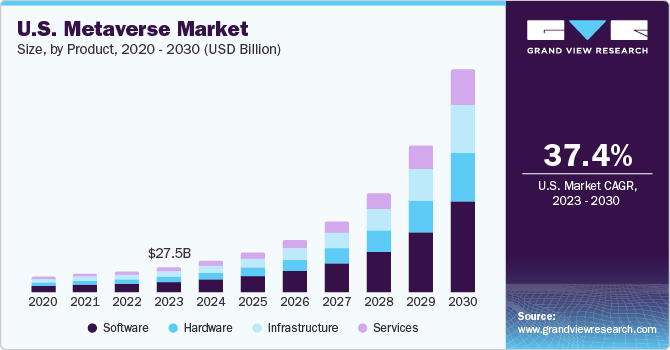U.S. Metaverse Market 2030: Exploring the Impact of Blockchain
The U.S. metaverse market was valued at USD 27.50 billion in 2023 and is forecasted to reach USD 253.77 billion by 2030.
The U.S. metaverse market was valued at USD 27.50 billion in 2023 and is forecasted to reach USD 253.77 billion by 2030, growing at a compound annual growth rate (CAGR) of 37.4% from 2024 to 2030. A key driver of this growth is the increasing focus on bridging the digital and physical worlds through the internet. Additionally, digital twins are becoming more sophisticated and powerful, although their full potential requires seamless system and data integration across entire business ecosystems. Metaverse technology is poised to spark a digital revolution, impacting virtually every facet of human life. Central to the metaverse concept is the idea of an immersive internet — a vast, persistent, unified, and shared virtual space. This evolution is further propelled by the adoption of emerging technologies such as 5G, extended reality (XR), and artificial intelligence (AI).

The rapid rise of social media usage and the strong demand for more social and immersive gaming experiences have amplified the metaverse’s significance among leading companies. Virtual environments and games within the metaverse are increasingly monetizing their digital assets, avatars, and operational tools as non-fungible tokens (NFTs), with digital assets often appreciating in value compared to their physical equivalents. For example, Meta Mall is a metaverse platform that allows users to develop, own, stake, and trade virtual real estate as NFTs.
Major corporations are heavily investing in the metaverse to foster innovation and secure competitive advantages. For instance, in June 2022, Samsung’s U.S. division launched its official Discord server to deepen its engagement in the Web3 space. Previously, Samsung introduced “Samsung 837X,” an immersive metaverse experience within Decentraland, and “Samsung Superstar Galaxy” on Roblox.
Order a free sample PDF of the U.S. Metaverse Market Intelligence Study, published by Grand View Research.
Key Market Trends & Insights
- By Product: The software segment accounted for more than 39% of the U.S. metaverse market in 2023 and is expected to grow substantially during the forecast period. The rising demand for virtual communication, especially in entertainment and gaming, is a major growth factor for this segment.
- By Platform: The desktop segment led with over 41% of the revenue share in 2023. The increasing popularity of virtual desktops and the global rise in PC gaming are driving growth in this area.
- By Technology: Virtual reality (VR) and augmented reality (AR) technologies held the largest share of over 34% in 2023. AR is emerging as a significant innovation, extending beyond smartphones and tablets to wearable devices like smart glasses, which require new user experience (UX) and design approaches.
- By Application: The gaming segment dominated the market with over 26% revenue share in 2023. The focus on delivering immersive and ultra-realistic gaming experiences through the metaverse has propelled this segment’s expansion.
- By End-Use: The Banking, Financial Services, and Insurance (BFSI) sector captured the largest revenue share in 2023. The banking metaverse offers comprehensive views of banks’ operations, integrating blockchain, NFT marketplaces, and decentralized finance (DeFi) digital assets, making it particularly advantageous for this industry.
Market Size & Forecast
- 2023 Market Size: USD 27.50 Billion
- 2030 Projected Market Size: USD 253.77 Billion
- CAGR (2024-2030): 37.4%
Key Companies & Market Share Insights
Leading players in the U.S. metaverse market include Meta Platforms, Inc., Epic Games, Inc., NVIDIA Corporation, Unity Technologies, Inc., and Roblox Corporation.
- NVIDIA Corporation, a global leader in graphics processors and multimedia software, specializes in GPUs for professional and gaming markets, as well as systems-on-chip for automotive and mobile computing. In March 2023, NVIDIA partnered with Microsoft to develop industrial metaverse solutions via Azure cloud and AI capabilities. Microsoft Azure will host NVIDIA DGX Cloud and Omniverse Cloud platforms for building and operating 3D virtual worlds.
- In May 2022, Epic Games and WPP plc announced a collaboration to create next-generation interactive experiences. The partnership aims to educate creators and brands on developing custom metaverse concepts using Unreal Engine, Fortnite, and 3D marketplaces like Sketchfab and ArtStation.
- Emerging players such as Roblox Corporation and Active Theory are also gaining traction. Roblox operates a user-generated 3D experience platform. In January 2023, Roblox launched its Creator Hub, offering developers enhanced tools and centralized documentation.
- Active Theory is a creative digital production studio that leverages web technologies to develop websites, advertisements, apps, AR and VR experiences, and other digital solutions.
Key Players
- Meta Platforms, Inc.
- NVIDIA Corporation
- Epic Games, Inc.
- Roblox Corporation
- Unity Technologies, Inc.
- Active Theory
- Google LLC
- Microsoft Corporation
- Inoru
- Maticz Technologies Private Limited
Explore Horizon Databook – The world's most expansive market intelligence platform developed by Grand View Research.
Conclusion
The U.S. metaverse market is experiencing exponential growth, driven by technological advances and increased interest in immersive digital experiences across social, gaming, and enterprise sectors. The expansion is fueled by the integration of emerging technologies like 5G, AI, VR, and AR, which enable increasingly sophisticated and interactive virtual environments. With major corporations investing heavily and new players innovating, the metaverse is set to transform digital interaction and economic activity. Forecasted to reach USD 253.77 billion by 2030 at a CAGR of 37.4%, the U.S. metaverse market is poised to become a central pillar of the digital economy in the coming decade.